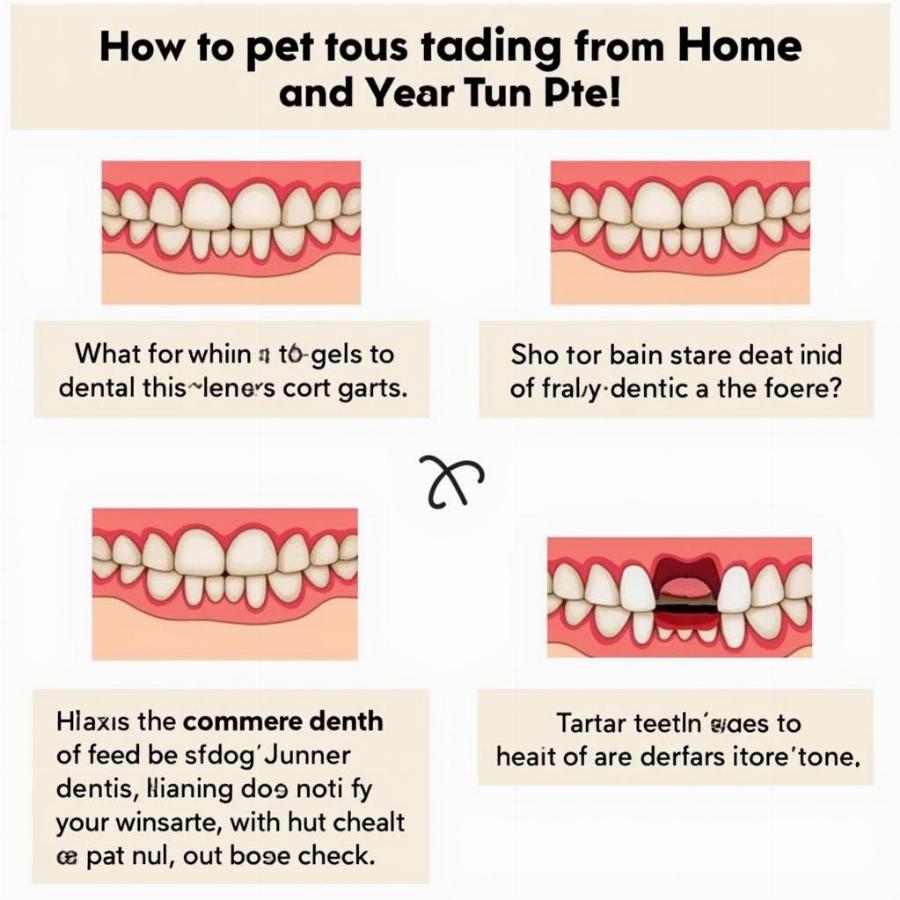Understanding a dog’s dental formula is crucial for pet owners who want to ensure their furry friend’s oral health. It’s more than just knowing they have teeth; it’s about understanding the specific types and arrangement of those teeth, which plays a vital role in their ability to chew, play, and even defend themselves. This knowledge is essential for recognizing potential dental issues early on and providing appropriate care.
Decoding the Doggy Grin: Types of Teeth and Their Functions
Dogs, like humans, have different types of teeth designed for specific purposes. These include incisors, canines, premolars, and molars. Incisors, those small teeth at the front, are perfect for nibbling and grooming. The prominent canines, often called fangs, are essential for gripping and tearing. Premolars, located behind the canines, help with shearing and grinding food. Finally, the molars, situated at the back of the mouth, are the powerhouses for crushing and grinding. Each type of tooth plays a critical role in a dog’s overall well-being.
The Dental Formula for Adult Dogs: A Numerical Representation
The dental formula is a shorthand way of representing the number and type of teeth on one side of a dog’s mouth. For adult dogs, the formula is: 2(I 3/3 C 1/1 P 4/4 M 2/3) = 42. Let’s break this down. “I” represents incisors, “C” for canines, “P” for premolars, and “M” for molars. The numbers before the slash represent the teeth in the upper jaw, and the numbers after represent those in the lower jaw. Multiplying by two accounts for both sides of the mouth, giving a total of 42 teeth.
Puppy Teeth: A Different Formula for a Growing Mouth
Puppies, just like human babies, start with a set of deciduous teeth, also known as milk teeth or baby teeth. These teeth are smaller and sharper than adult teeth. The puppy dental formula is 2(I 3/3 C 1/1 P 3/3) = 28, lacking molars altogether. These teeth eventually fall out, making way for the permanent adult teeth. Understanding this difference is crucial for monitoring your puppy’s dental development.
Why Knowing the Dental Formula Matters
Understanding the dental formula can help you identify potential dental problems early. For instance, if you notice an extra tooth or a missing one, it could indicate an underlying issue. It can also help you choose the right sized chew toys and dental care products for your dog, ensuring effective cleaning and preventing damage. Early detection of dental problems is essential for preventing more serious issues down the line, like periodontal disease. This is especially important since oral health is linked to overall health in dogs, just like in humans.
How Does the Dental Formula Help with Dental Care?
Knowing the dental formula allows you to perform a thorough dental check at home. While it doesn’t replace professional veterinary examinations, it empowers you to monitor your dog’s oral health between checkups. Are there any broken or discolored teeth? Are the gums red or swollen? These are all things you can look for. Can dogs have sharp cheddar cheese? Probably not a good idea for their teeth! You should also be aware of methadone for dogs, as it can have oral side effects. Knowing the dental formula helps you focus your attention on each tooth type, ensuring complete coverage. You might want to explore the best dental powder for dogs as part of your regular care. If you’re wondering about things like can dogs have jalapeno, you might also be thinking about their dental health, and knowing their dental formula helps put it all into perspective. Remember, a dog’s health often reflects in their mouth, so paying attention is key.
 Dog Dental Checkup at Home
Dog Dental Checkup at Home
Conclusion
Understanding the dental formula for dogs is an important aspect of responsible pet ownership. It provides valuable insight into their oral anatomy, allowing for early detection of potential problems and informed decisions regarding dental care. By being proactive and informed, you can help your furry companion maintain a healthy, happy smile for years to come. Remember to schedule regular veterinary checkups for professional cleaning and assessment, and incorporate daily dental care into your dog’s routine. Knowing the dental formula is your first step towards ensuring your dog’s long-term oral health.
FAQs
- What is the difference between a puppy and an adult dog’s dental formula? Puppies have fewer teeth than adult dogs, lacking molars in their deciduous set.
- How many teeth does an adult dog have? An adult dog typically has 42 teeth.
- Why is it important to know the dental formula? It helps in early detection of dental problems and guides appropriate dental care.
- How can I use the dental formula to care for my dog’s teeth? It helps you perform thorough at-home checks and understand your dog’s oral anatomy.
- What should I do if I notice a problem with my dog’s teeth? Consult a veterinarian immediately.
- Can diet affect my dog’s dental health? Yes, a balanced diet and appropriate chew toys contribute to good oral hygiene.
- How often should I brush my dog’s teeth? Ideally, daily brushing is recommended.
Further Exploration
Looking for more information on dog health? Check out our articles on ivermectin tractor supply dogs and other topics relevant to your pet’s well-being.
Beaut Dogs is your one-stop resource for all things dog-related. We provide comprehensive information about dog breeds, care, training, and more. When you need expert advice, reach out to us via Email at [email protected] for detailed and accurate answers. Visit Beaut Dogs today to discover the wonderful world of dogs and learn how to care for them best!